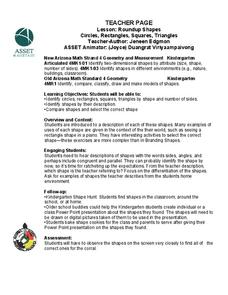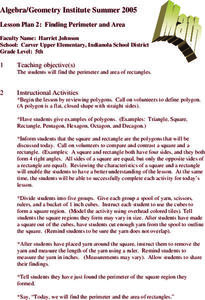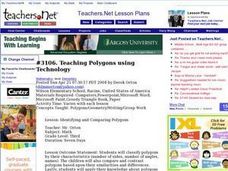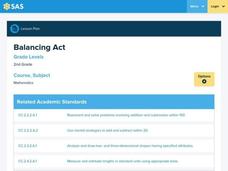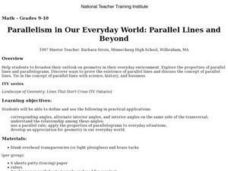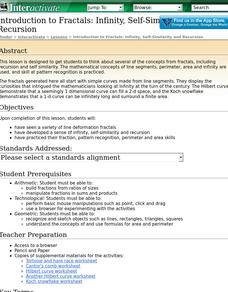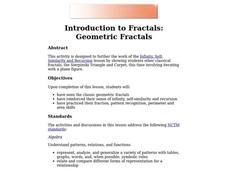Outdoor Learning Center
Outdoor Survival
Which of the following can you survive without for the longest time: water, food, or a positive mental attitude? The answer may surprise you. Guide learners of all ages through games, activities, and discussions about surviving in the...
Ohio Department of Education
Describing and Creating Plane Figures - Grade One
Young mathematicians draw, create, and describe different shapes using triangles. They discuss attributes of the original and created shapes. Pupils classify the created shapes and draw and write in mathematics journals to communicate...
It's About Time
Life (and Fewer Deaths) After Seat Belts
Seat belts reduce serious crash-related injuries and deaths by about half. Scholars continue crashing their cart with a crash test dummy into a wall, but this time, they experiment with different types of seat belts to reduce injuries....
Curated OER
Geo-Critters (Geometry Critters)
Students read the book The Math Curse by Jon Scieszka and study geometry. In this geometry instructional activity, students identify geometric shapes and their properties. Students create a geo-critter.
Curated OER
Developing Coordination Skills and Pencil Control Using Mouse Hockey
Young scholars explore motor skills by participating in a drawing activity. In this hand coordination lesson, students utilize activity sheets in which they drag their pencil in a specific direction quickly and efficiently. Young...
Curated OER
2-D Polygons
Students investigate the concept of two dimensional polygons. They complete a vocabulary chart with the teacher or in independently. Students are shown various polygons in order to classify them and then asked to draw one of them from...
Curated OER
Structures and Shapes
Students make jewelry using different shapes from magazines, tissue paper, cardboard, and other materials. In this making jewelry lesson plan, students complete this hands on activity to discuss how shapes are used.
Curated OER
Tantalizing Tangrams
Students construct a set of tangrams. In this geometry lesson, students read the book, Grandfather Tang's Story and retell the story using tangrams. Students construct their own set of tangrams using the included worksheets.
Alabama Learning Exchange
CELEBRATE!
Strengthen research skills by reviewing the months of the year and the holidays celebrated during those months. Learners draw and label a timeline for the months and label each holiday. They work in groups to research the holidays, and...
Curated OER
Roundup Shapes
Shapes are all around us! Kindergartenrs identify shapes in their world and guess the shape being described. They participate in a shape hunt.
Curated OER
Exploring Pythagorean Theorem
Eighth graders explore the Pythagorean Theorem. They use Geometer's Sketchpad and explore features of various figures. Students use the software to build a figure using the given measurements.
Curated OER
Finding Perimeter and Area
Geometers find the perimeter and area of rectangles. They discuss the definitions and characteristics of rectangles and squares. In groups, they use yarn to discover the perimeter of squares and rectangles. They count cubes to explore...
Curated OER
nvestigation - Justin and Daniel's Puzzles
Seventh graders explore area and perimeter, using tangram pieces. They discover the area and perimeter of rectangles and squares. After experimentation, 7th graders write a rule for finding the perimeter and area of squares and rectangles.
Curated OER
Tangrams
Students construct tangram pieces. Then they make observations and explore patterns with the pieces.
Curated OER
Making and Describing Shapes
Explore the concept of creating and describing 2D and 3D shapes. Using geometry your scholars will describe the attributes of shapes and their properties. They explore and discover what happens when you combine shapes and then take...
Curated OER
Triangle Inequality Theorem
Learners use the inequality theorem to solve triangles and their properties. In this geometry lesson, students are given spaghetti of different lengths and asked to create triangles. They conclude the necessary length needed to make a...
Curated OER
Teaching Polygons using Technology
Third graders utilize different types of computer programs, such as Microsoft paint and Microsoft Word to study and create different types of polygons. They use PowerPoint to create a story about a shape and others that it meets during a...
Curated OER
Balancing Act
Second graders identify the attributes of various shapes and estimate the weight of the objects. In this geometry lesson, 2nd graders identify the attributes of concrete objects and use a pan balance to weight them.
Curated OER
Usefulness of Irrigation
Students explore irrigation. In this science lesson plan, students show that water is necessary for plant growth and show how a dam can turn a nearly useless water way into a valuable form of irrigation.
Curated OER
Parallelism in Our Everyday World: Parallel Lines and Beyond
Students broaden their outlook on geometry in their everyday environment. They explore the properties of parallel lines and parallelograms and discover ways to prove the existence of parallel lines and discuss the concept of parallel lines.
Curated OER
Shaping Up with Nature at Black Bayou Lake
Students visit a local lake refuge and identify shapes they find in nature. They take pictures of the various shapes and use KidPix to draw shapes around the shapes in the pictures. They watch a slideshow of all the shapes found by their...
Curated OER
What are the Kinds of Triangles?
Fifth graders classify triangles. In this triangle lesson, 5th graders learn about the characteristics that make up a triangle. They are instructed through video, PowerPoint slides, and teacher-led demonstrations.
Curated OER
Introduction to Fractals: Infinity, Self-Similarity and Recursion.
This lesson introduces students to the ideas involved in understanding fractals. They develop a sense of infinity, self-similarity and recursion and
Curated OER
Introduction to Fractals: Geometric Fractals
Students study and observe the patterns made by the areas of the Sierpinski Triangle. Students use the computer to draw two or three iterations to discover the number patterns. Students complete worksheets based on Geometric Fractals.











